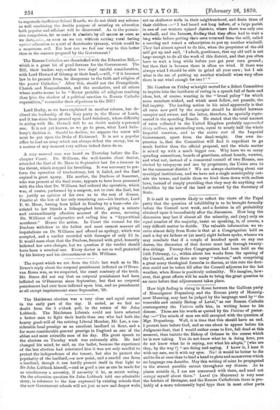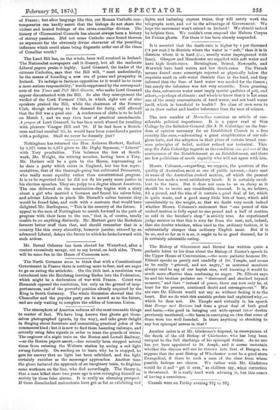How high feeling is rising in Rome between the Galilean
party of Monseigneur Dupanloup and the Roman party of Monseig- neur Manning, may best be judged by the language used by " the venerable and saintly Bishop of Laval," as our Roman Catholic contemporary the Vatican calls him, in writing home to his diocese. These are his words as quoted by the Vatican of yester- day :—" The minds of men are still occupied with the question of Mgr. Dupanloup. Well, it is time that this should have an end. I protest here before God, and as one about to appear before his Judgment-Seat, that I would rather cease to live, fall dead at this moment, than imitate the Bishop of Orleans in the course which he is now taking. You do not know what he is doing here, you do not know what he is saying, nor what his adepts," [who are they, by the way 7] " are doing and saying. I know it, I hear it with my ears, see it with my eyes. No ! it would be better to die and to die at once than to lend a hand to plots and manoeuvres which no language can describe. May this writing of mine be propagated to the utmost possible extent throughout my diocese. As to places outside it, I am not concerned with them, and need not occupy myself about them." Laval (in Mayenne) is very near the borders of Bretagne, and the Roman Catholicism there is pro- bably of a more vehemently loyal type than in most other parts
of France ; but after language like this, our Roman Catholic con- temporaries can hardly assert that the bishops do not share the violent and heated feelings of the extra-conciliar divines. The -history of (Ecumenical Councils has almost always been a history of stormy passions. Did not some Catholic once found thereon an argument for the obviously divine character of the presiding influence which could alone bring dogmatic order out of the chaos of Conciliar wrath?



































 Previous page
Previous page